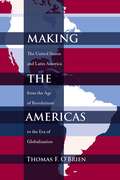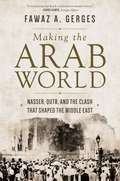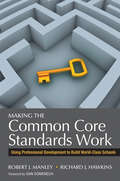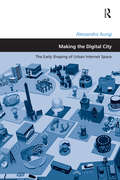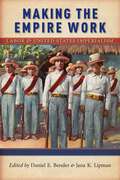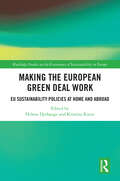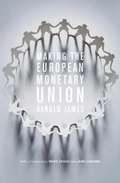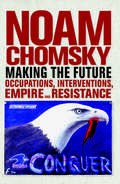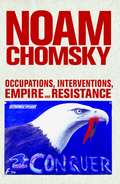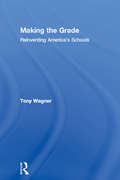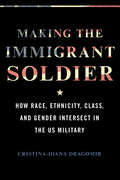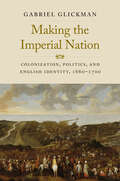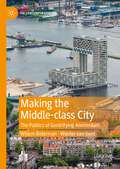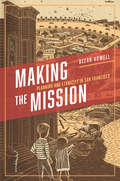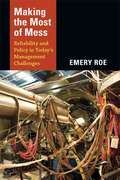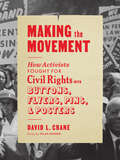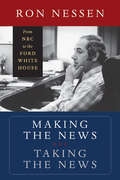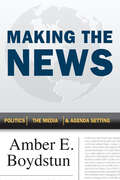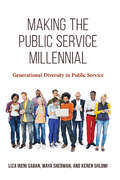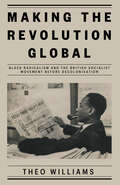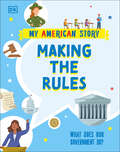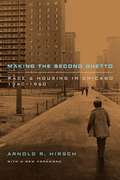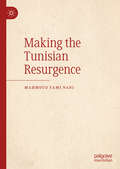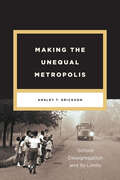- Table View
- List View
Making the Americas: The United States and Latin America from the Age of Revolutions to the Era of Globalization (Diálogos Series)
by Thomas F. O'BrienAmericans' belief in their economic, political, and cultural superiority launched them on a mission to transform Latin America that has evolved into a global process of Americanization. From corporate and philanthropic initiatives to military interventions, Americans motivated by self-interest and idealism sought to reshape Latin America and gave birth to the American driven process of globalization. Synthesizing a broad range of international relations scholarship, including perspectives from gender, race, and cultural studies, O'Brien offers a sweeping history of the Americas that ranges from the adventures of eighteenth-century whaling men to the contemporary struggle over globalization. As a part of this study, the author explains how the responses of Latin Americans to Americanization have varied from the vehement rejection of U.S. economic dominance to embracing as well as reconfiguring the icons of American consumer culture. O'Brien's goal is to provide readers with a nuanced understanding of how the people of the Americas have shaped their own history, and influenced the development of U.S. economic, strategic, and cultural power in the world today.
Making the Arab World: Nasser, Qutb, and the Clash That Shaped the Middle East
by Fawaz A. GergesHow the conflict between political Islamists and secular-leaning nationalists has shaped the history of the modern Middle EastIn 2013, just two years after the popular overthrow of Hosni Mubarak, the Egyptian military ousted the country’s first democratically elected president—Mohamed Morsi of the Muslim Brotherhood—and subsequently led a brutal repression of the Islamist group. These bloody events echoed an older political rift in Egypt and the Middle East: the splitting of nationalists and Islamists during the rule of Egyptian president and Arab nationalist leader Gamal Abdel Nasser. In Making the Arab World, Fawaz Gerges, one of the world’s leading authorities on the Middle East, tells how the clash between pan-Arab nationalism and pan-Islamism has shaped the history of the region from the 1920s to the present.Gerges tells this story through an unprecedented dual biography of Nasser and another of the twentieth-century Arab world’s most influential figures—Sayyid Qutb, a leading member of the Muslim Brotherhood and the father of many branches of radical political Islam. Their deeply intertwined lives embody and dramatize the divide between Arabism and Islamism. Yet, as Gerges shows, beyond the ideological and existential rhetoric, this is a struggle over the state, its role, and its power.Based on a decade of research, including in-depth interviews with many leading figures in the story, Making the Arab World is essential reading for anyone who wants to understand the roots of the turmoil engulfing the Middle East, from civil wars to the rise of Al-Qaeda and ISIS.
Making the Common Core Standards Work: Using Professional Development to Build World-Class Schools
by Dr Robert J. Manley Richard J. HawkinsEssential reading for school leaders! Providing a blueprint for implementing and exceeding the new Common Core State Standards, this practical guide focuses on realistic strategies for lasting change within schools. The authors build an inspiring case for how individual schools can develop a world-class education system through targeted professional development. Topics include: Empowering teachers and staff as partners in implementing the new standards Adapting existing curriculum to meet grade-level goals for mathematics and language arts Designing assessments that measure mastery of the standards Ensuring that the standards benefit all students, including multicultural learners
Making the Digital City: The Early Shaping of Urban Internet Space (Design and the Built Environment)
by Alessandro AurigiSince the late 1990s, Information and Communication Technologies (ICTs) have been hailed as a potentially revolutionary feature of the planning and management of Western cities. Economic regeneration and place promotion strategies have exploited these new technologies; city management has experimented with electronically distributed services, and participation in public life and democratic decision-making processes can be made more flexible by the use of ICTs. All of these technological initiatives have often been presented and accessed via an urban front-end information site known as 'digital city' or 'city network.' Illustrated by a range of European case studies, this volume examines the social, political and management issues and potential problems in the establishment of an electronic layer of information and services in cities. The book provides a better understanding of the direction European cities are going towards in the implementation of ICTs in the urban arena.
Making the Empire Work: Labor and United States Imperialism (Culture, Labor, History #13)
by Daniel E. Bender Jana K. LipmanMillions of laborers, from the Philippines to the Caribbean, performed the work of the United States empire. Forging a global economy connecting the tropics to the industrial center, workers harvested sugar, cleaned hotel rooms, provided sexual favors, and filled military ranks. Placing working men and women at the center of the long history of the U.S. empire, these essays offer new stories of empire that intersect with the "grand narratives" of diplomatic affairs at the national and international levels. Missile defense, Cold War showdowns, development politics, military combat, tourism, and banana economics share something in common--they all have labor histories. This collection challenges historians to consider the labor that formed, worked, confronted, and rendered the U.S. empire visible. The U.S. empire is a project of global labor mobilization, coercive management, military presence, and forced cultural encounter. Together, the essays in this volume recognize the United States as a global imperial player whose systems of labor mobilization and migration stretched from Central America to West Africa to the United States itself. Workers are also the key actors in this volume. Their stories are multi-vocal, as workers sometimes defied the U.S. empire's rhetoric of civilization, peace, and stability and at other times navigated its networks or benefited from its profits. Their experiences reveal the gulf between the American 'denial of empire' and the lived practice of management, resource exploitation, and military exigency. When historians place labor and working people at the center, empire appears as a central dynamic of U.S. history.
Making the European Green Deal Work: EU Sustainability Policies at Home and Abroad (Routledge Studies on the Governance of Sustainability in Europe)
by Helene Dyrhauge and Kristina KurzeThis book critically analyses different dimensions in the sustainable transitions outlined by the European Green Deal, focusing on both internal actions and external relations and highlighting the EU’s diverging powers and capabilities in achieving the core objectives. As with the Green Deal itself, the chapters cover different policies including financial instruments, energy policies, climate policies and external policies and apply the ideal-type logics of appropriateness and consequences to analyse sustainable transformations. The variety of the cases contribute to a broad understanding of how different actors interpret and implement the aims of the European Green Deal, including especially those lagging behind, who, for various reasons, are struggling with the sustainable transition. From examining their policies, the book illuminates the challenges and opportunities they are facing. Overall, the contributions address key questions surrounding the EU’s powers and limits in inducing transformative change and implementing the European Green Deal. This book will be of key interest to scholars, students and practitioners of EU sustainability policies, sustainability transitions and green economy, environmental studies, energy policy, energy governance and climate change, public policy, comparative politics and international relations.
Making the European Monetary Union
by Harold JamesEurope’s financial crisis cannot be blamed on the Euro, Harold James contends in this probing exploration of the whys, whens, whos, and what-ifs of European monetary union. The current crisis goes deeper, to a series of problems that were debated but not resolved at the time of the Euro’s invention. Since the 1960s, Europeans had been looking for a way to address two conundrums simultaneously: the dollar’s privileged position in the international monetary system, and Germany’s persistent current account surpluses in Europe. The Euro was created under a politically independent central bank to meet the primary goal of price stability. But while the monetary side of union was clearly conceived, other prerequisites of stability were beyond the reach of technocratic central bankers. Issues such as fiscal rules and Europe-wide banking supervision and regulation were thoroughly discussed during planning in the late 1980s and 1990s, but remained in the hands of member states. That omission proved to be a cause of crisis decades later. Here is an account that helps readers understand the European monetary crisis in depth, by tracing behind-the-scenes negotiations using an array of sources unavailable until now, notably from the European Community’s Committee of Central Bank Governors and the Delors Committee of 1988–89, which set out the plan for how Europe could reach its goal of monetary union. As this foundational study makes clear, it was the constant friction between politicians and technocrats that shaped the Euro. And, Euro or no Euro, this clash will continue into the future.
Making the Future
by Noam Chomsky"Unwavering political contrarian Noam Chomsky smart-bombs the U.S. military's global Interventions (City Lights). Shock and awe!"-Vanity FairMaking the Future presents more than fifty concise and persuasively argued commentaries on U.S. politics and policies, written between 2007 and 2011. Taken together, Chomsky's essays present a powerful counter-narrative to official accounts of the major political events of the past four years: the wars in Afghanistan and Iraq; the U.S. presidential race; the ascendancy of China; Latin America's leftward turn; the threat of nuclear proliferation in Iran and North Korea; Israel's invasion of Gaza and expansion of settlements in Jerusalem and the West Bank; developments in climate change; the world financial crisis; the Arab Spring; the assassination of Osama bin Laden; and the Occupy protests. Laced throughout his critiques are expressions of commitment to democracy and the power of popular struggles. "Progressive legislation and social welfare," writes Chomsky, "have been won by popular struggles, not gifts from above. Those struggles follow a cycle of success and setback. They must be waged every day, not just once every four years, always with the goal of creating a genuinely responsive democratic society, from the voting booth to the workplace."Making the Future is a follow-up to Interventions, published by City Lights in 2007 and banned from Guantánamo Bay by U.S. military censors. Both books are drawn from articles Chomsky has been writing regularly for the New York Times Syndicate, but which go largely ignored by newspapers in the United States. Making the Future offers fierce, accessible, timely, gloves-off political writing by one of America's foremost intellectual and political dissidents.
Making the Future: Occupations, Interventions, Empire and Resistance
by Noam ChomskyMaking the Future presents more than fifty concise and persuasively argued commentaries on U.S. politics and policies, written between 2007 and 2011. Taken together, Chomsky's essays present a powerful counter-narrative to official accounts of the major political events of the past four years: the wars in Afghanistan and Iraq; the U.S. presidential race; the ascendancy of China; Latin America's leftward turn; the threat of nuclear proliferation in Iran and North Korea; Israel's invasion of Gaza and expansion of settlements in Jerusalem and the West Bank; developments in climate change; the world financial crisis; the Arab Spring; the assassination of Osama bin Laden; and the Occupy protests. Laced throughout his critiques are expressions of commitment to democracy and the power of popular struggles. "Progressive legislation and social welfare," writes Chomsky, "have been won by popular struggles, not gifts from above. Those struggles follow a cycle of success and setback. They must be waged every day, not just once every four years, always with the goal of creating a genuinely responsive democratic society, from the voting booth to the workplace." Making the Future is a follow-up to Interventions, published by City Lights in 2007 and banned from Guantánamo Bay by U.S. military censors. Both books are drawn from articles Chomsky has been writing regularly for the New York Times Syndicate, but which go largely ignored by newspapers in the United States. Making the Future offers fierce, accessible, timely, gloves-off political writing by one of America's foremost intellectual and political dissidents.
Making the Grade: Reinventing America's Schools
by Tony WagnerThis book provides a guide for a long-overdue public dialogue about why and how we need to reinvent our nation's schools. How has the world changed for our children; what do all students need to know in light of these changes; how do we hold students and schools accountable for results; what do good schools look like; and what must leaders do to create more of these schools? These are some of the questions that drive this book. The answers emerging to these questions may surprise many. The most successful public schools of the 21st century look a lot more like our 19th century village schools than our current factory model of schooling. This book describes these "new village schools" that have been created in the last decade and suggests that they are a prototype for the schools of the future.
Making the Immigrant Soldier: How Race, Ethnicity, Class, and Gender Intersect in the US Military
by Cristina-Ioana DragomirImmigrants to the United States have long used the armed forces as a shortcut to citizenship. Cristina-Ioana Dragomir profiles Lily, Alexa, and Vikrant, three immigrants of varying nationalities and backgrounds who chose military service as their way of becoming American citizens. Privileging the trio’s own words and experiences, Dragomir crafts a human-focused narrative that moves from their lives in their home countries and decisions to join the military to their fraught naturalization processes within the service. Dragomir illuminates how race, ethnicity, class, and gender impacted their transformation from immigrant to soldier, veteran, and American. She explores how these factors both eased their journeys and created obstacles that complicated their access to healthcare, education, economic resources, and other forms of social justice. A compelling union of analysis and rich storytelling, Making the Immigrant Soldier traces the complexities of serving in the military in order to pursue the American dream.
Making the Imperial Nation: Colonization, Politics, and English Identity, 1660-1700 (The Lewis Walpole Series in Eighteenth-Century Culture and History)
by Gabriel GlickmanHow did the creation of an overseas empire change politics in England itself? After 1660, English governments aimed to convert scattered overseas dominions into a coordinated territorial power base. Stuart monarchs encouraged schemes for expansion in America, Africa, and Asia, tightened control over existing territories, and endorsed systems of slave labor to boost colonial prosperity. But English power was precarious, and colonial designs were subject to regular defeats and failed experimentation. Recovering from recent Civil Wars at home, England itself was shaken by unrest and upheaval through the later seventeenth century. Colonial policies emerged from a kingdom riven with inner tensions, which it exported to enclaves overseas. Gabriel Glickman reinstates the colonies within the domestic history of Restoration England. He shows how the pursuit of empire raised moral and ideological controversies that divided political opinion and unsettled many received ideas of English national identity. Overseas ambitions disrupted bonds in Europe and cast new questions about English relations with Scotland and Ireland. Vigorous debates were provoked by contact with non-Christian peoples and by changes brought to cultural tastes and consumer habits at home. England was becoming an imperial nation before it had acquired a secure territorial empire. The pressures of colonization exerted a decisive influence over the wars, revolutions, and party conflicts that destabilized the later Stuart kingdom.
Making the Middle-class City: The Politics of Gentrifying Amsterdam (The Contemporary City)
by Willem Boterman Wouter van GentThis book seeks to understand the urban transformation of Amsterdam over a 40-year period. In addition to charting social and economic changes associated with gentrification, it analyses the electoral dynamics and middle-class politics that have underpinned Amsterdam’s change to a middle-class city.
Making the Mission: Planning and Ethnicity in San Francisco
by Ocean HowellIn the aftermath of the 1906 San Francisco earthquake, residents of the city's iconic Mission District bucked the city-wide development plan, defiantly announcing that in their neighborhood, they would be calling the shots. Ever since, the Mission has become known as a city within a city, and a place where residents have, over the last century, organized and reorganized themselves to make the neighborhood in their own image. In Making the Mission, Ocean Howell tells the story of how residents of the Mission District organized to claim the right to plan their own neighborhood and how they mobilized a politics of place and ethnicity to create a strong, often racialized identity--a pattern that would repeat itself again and again throughout the twentieth century. Surveying the perspectives of formal and informal groups, city officials and district residents, local and federal agencies, Howell articulates how these actors worked with and against one another to establish the very ideas of the public and the public interest, as well as to negotiate and renegotiate what the neighborhood wanted. In the process, he shows that national narratives about how cities grow and change are fundamentally insufficient; everything is always shaped by local actors and concerns.
Making the Modern American Fiscal State
by Ajay K. MehrotraAt the turn of the twentieth century, the US system of public finance underwent a dramatic transformation. The late nineteenth-century regime of indirect, hidden, partisan, and regressive taxes was eclipsed in the early twentieth century by a direct, transparent, professionally administered, and progressive tax system. In Making the American Fiscal State, Ajay K. Mehrotra uncovers the contested roots and paradoxical consequences of this fundamental shift in American tax law and policy. He argues that the move toward a regime of direct and graduated taxation marked the emergence of a new fiscal polity - a new form of statecraft that was guided not simply by the functional need for greater revenue but by broader social concerns about economic justice, civic identity, bureaucratic capacity, and public power. Between the end of Reconstruction and the onset of the Great Depression, the intellectual, legal, and administrative foundations of the modern fiscal state first took shape. This book explains how and why this new fiscal polity came to be.
Making the Most of Mess: Reliability and Policy in Today's Management Challenges
by Emery RoeIn Making the Most of Mess, Emery Roe emphasizes that policy messes cannot be avoided or cleaned up; they need to be managed. He shows how policymakers and other professionals can learn these necessary skills from control operators who manage large critical infrastructures such as water supplies, telecommunications systems, and electricity grids. The ways in which they prevent major accidents and failures offer models for policymakers and other professionals to manage the messes they face. Throughout, Roe focuses on the global financial mess of 2008 and its ongoing aftermath, showing how mismanagement has allowed it to morph into other national and international messes. More effective management is still possible for this and many other policy messes but that requires better recognition of patterns and formulation of scenarios, as well as the ability to translate pattern and scenario into reliability. Developing networks of professionals who respond to messes is particularly important. Roe describes how these networks enable the avoidance of bad or worse messes, take advantage of opportunities resulting from messes, and address societal and professional challenges. In addition to finance, he draws from a wide range of case material in other policy arenas. Roe demonstrates that knowing how to manage policy messes is the best approach to preventing crises.
Making the Movement: How Activists Fought for Civil Rights with Buttons, Flyers, Pins, and Posters
by David L. CranePacked with over 200 color photos, this visual journey through Black history and the Civil Rights Movement is told through the objects—buttons, badges, flyers, pennants, posters, and more—designed by activists as tools to advance the fight for justice and freedom, offering a unique perspective on the Civil Rights Movement from Emancipation through the present day. From Reconstruction through Jim Crow, through the protest era of the 1960s and '70s, to current-day resistance and activism such as the Black Lives Matter movement, the material culture of the Civil Rights Movement has been integral to its goals and tactics. During decades of sit-ins, marches, legal challenges, political campaigns, boycotts, and demonstrations, objects such as buttons, flyers, pins, and posters have been key in the fight against racism, oppression, and violence. Making the Movement presents more than 200 of these nonviolent weapons alongside the stories of the activists, organizations, and campaigns that defined and propelled the cause of civil rights. It is a must-read for anyone seeking to learn about Black and African American history in the United States and about strategies to combat racism and the structures that support it.
Making the News, Taking the News: From NBC to the Ford White House
by Ron NessenFor fifteen years, Ron Nessen enjoyed an extraordinary career covering the major national events of the 1960s and '70s for NBC News, and later serving as White House press secretary to President Gerald R. Ford. Making the News, Taking the News remembers the events and personalities that dominated national politics during Nessen's career, bringing a hard-won perspective to those tumultuous times. Through an interweaving of countless incidents and personal anecdotes, Nessen builds a story that captures the true grit of closed-door politics. Off-the-record briefings and strategy sessions, as well as descriptions of experiences with Vietnam troops in the field, provide a vivid illustration of the life of an on-the-road reporter. At the heart of the book is Nessen's White House years, as the veteran reporter gives a valuable eyewitness account of events both behind the scenes and in front of the cameras that shaped and altered America during two critical decades.
Making the News: Politics, the Media & Agenda Setting
by Amber E. BoydstunMedia attention can play a profound role in whether or not officials act on a policy issue, but how policy issues make the news in the first place has remained a puzzle. Why do some issues go viral and then just as quickly fall off the radar? How is it that the media can sustain public interest for months in a complex story like negotiations over Obamacare while ignoring other important issues in favor of stories on “balloon boy?” With Making the News, Amber Boydstun offers an eye-opening look at the explosive patterns of media attention that determine which issues are brought before the public. At the heart of her argument is the observation that the media have two modes: an “alarm mode” for breaking stories and a “patrol mode” for covering them in greater depth. While institutional incentives often initiate alarm mode around a story, they also propel news outlets into the watchdog-like patrol mode around its policy implications until the next big news item breaks. What results from this pattern of fixation followed by rapid change is skewed coverage of policy issues, with a few receiving the majority of media attention while others receive none at all. Boydstun documents this systemic explosiveness and skew through analysis of media coverage across policy issues, including in-depth looks at the waxing and waning of coverage around two issues: capital punishment and the “war on terror.” Making the News shows how the seemingly unpredictable day-to-day decisions of the newsroom produce distinct patterns of operation with implications—good and bad—for national politics.
Making the Public Service Millennial: Generational Diversity in Public Service
by Maya Sherman Liza Ireni Saban Keren ShlomiMaking the Public Service Millennial explores how a new generation of public service employees affects the dynamics of continuity and change in public management and ethics. The book begins with the premise that Generation Y poses new challenges for public management, which will lead to changes in work-related values, rules, structures, and behaviors in the public service system. Will the soon-future leaders of today's public organizations pose new challenges for public management? How will this cohort cope with ethically-questionable behaviors? Given these questions, the potential strategic value of an empirical, cohort-based approach to ethical decision-making in the public service suggests interesting managerial implications for the effective incorporation of ethics into the management of public organizations. With implications for many types of organizations, and particularly for public sector organizations in democratic societies, managers across organizations should view generational differences not merely as a demographic variable, but as manifestations of broader social trends that may undermine established public management practices and organizational climates.
Making the Revolution Global: Black Radicalism and the British Socialist Movement before Decolonisation
by Theo WilliamsHow black radicals reshaped the British leftMaking the Revolution Global shows how black radicals transformed socialist politics in Britain in the years before decolonisation. African and Caribbean activist-intellectuals, such as Amy Ashwood Garvey, C.L.R. James, Jomo Kenyatta, Kwame Nkrumah and George Padmore, came to Britain during the 1930s and 1940s and intervened in debates about capitalism, imperialism, fascism and war. They consistently argued that any path towards international socialism must have colonial liberation at its heart. Although their ideas were met with opposition from many on the British Left, they convinced significant sections of the movement of the revolutionary potential of colonised peoples. By centring the entanglements between black radicals and the wider British socialist movement, Theo Williams casts new light on responses to the 1935 Italian invasion of Ethiopia, the 1945 Fifth Pan-African Congress, and a wealth of other events and phenomena. In doing so, he showcases a revolutionary tradition that, as illustrated by the global Black Lives Matter demonstrations of 2020, is still relevant today.
Making the Rules: What does our Government do? (My American Story)
by DKInspires young learners to explore America&’s government institutions through the nation&’s history and the experience of modern AmericansPart of an inspiring series of books that supports students in understanding government and civics in the United States, Making the Rules interweaves historical context, events, and personalities with the experiences of modern Americans to help students understand key social studies topics, including the origins of American institutions and values and their relevance to young people&’s lives today.The book explores government&’s impact on daily life, including raising money through taxation, security, protecting citizens&’ rights, organization, and providing services. The author also explains the role of other authorities such as state government. Historical topics and events include examples of different roles of government: security during wartime, providing services, and supporting people in need of help.
Making the Second Ghetto: Race and Housing in Chicago, 1940-1960
by Arnold R. HirschIn Making the Second Ghetto, Arnold Hirsch argues that in the post-depression years Chicago was a "pioneer in developing concepts and devices" for housing segregation. Hirsch shows that the legal framework for the national urban renewal effort was forged in the heat generated by the racial struggles waged on Chicago's South Side. His chronicle of the strategies used by ethnic, political, and business interests in reaction to the great migration of southern blacks in the 1940s describes how the violent reaction of an emergent "white" population combined with public policy to segregate the city. "In this excellent, intricate, and meticulously researched study, Hirsch exposes the social engineering of the post-war ghetto. "—Roma Barnes, Journal of American Studies "According to Arnold Hirsch, Chicago's postwar housing projects were a colossal exercise in moral deception. . . . [An] excellent study of public policy gone astray. "—Ron Grossman, Chicago Tribune "An informative and provocative account of critical aspects of the process in [Chicago]. . . . A good and useful book. "—Zane Miller, Reviews in American History "A valuable and important book. "—Allan Spear, Journal of American History
Making the Tunisian Resurgence
by Mahmoud Sami NabiThis book investigates the socioeconomic factors that triggered Tunisia’s "revolution for dignity” and the current issues and challenges facing its economy while suggesting mechanisms and instruments for their resolution. The author begins by analyzing the roots of the revolution and the post-revolution situation from a political sociology perspective and then diagnoses the Tunisian economy before and after the revolution and identifies the multidimensional binding constraints preventing it from escaping the middle-income trap. The book then explores the pillars of an inclusive development strategy that Tunisia should pursue. The emphasis is made on building inclusive institutions, developing a new social contract and reinventing the country's leadership. Beyond the institutional dimension, the author suggests innovative financial channels, discusses the strategy of a successful integration of the Tunisian economy in the global economy as well as the pillars of its transformation into a knowledge-based economy.
Making the Unequal Metropolis: School Desegregation and Its Limits (Historical Studies of Urban America)
by Ansley T. EricksonIn a radically unequal United States, schools are often key sites in which injustice grows. Ansley T. Erickson's Making the Unequal Metropolis presents a broad, detailed, and damning argument about the inextricable interrelatedness of school policies and the persistence of metropolitan-scale inequality. While many accounts of education in urban and metropolitan contexts describe schools as the victims of forces beyond their control, Erickson shows the many ways that schools have been intertwined with these forces and have in fact--via land-use decisions, curricula, and other tools--helped sustain inequality. Taking Nashville as her focus, Erickson uncovers the hidden policy choices that have until now been missing from popular and legal narratives of inequality. In her account, inequality emerges not only from individual racism and white communities' resistance to desegregation, but as the result of long-standing linkages between schooling, property markets, labor markets, and the pursuit of economic growth. By making visible the full scope of the forces invested in and reinforcing inequality, Erickson reveals the complex history of, and broad culpability for, ongoing struggles in our schools.
